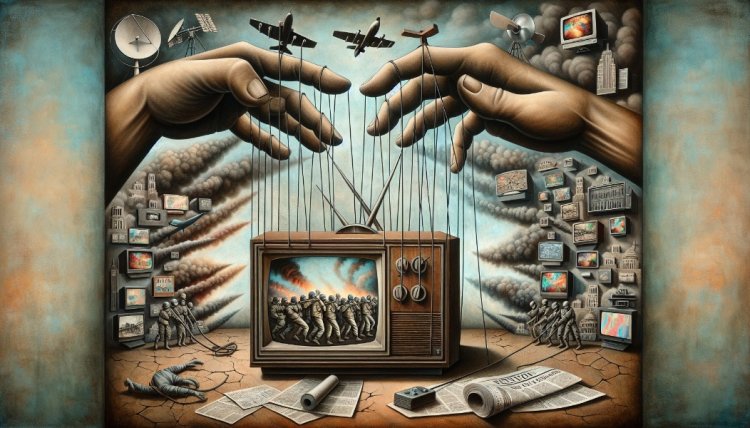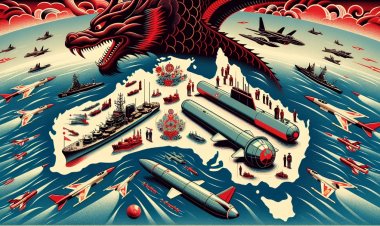The War You Don't See: Uncovering the Role of Media in Modern Warfare
"Discover 'The War You Don't See,' an in-depth exploration of the media's influential role in modern warfare. This article unveils how media coverage shapes public perception, policy decisions, and the very nature of contemporary conflicts, highlighting the power and responsibility of the press in times of war."

Introduction
The 24-hour news cycle has revolutionised the way we consume news, providing us with constant coverage of wars and conflicts happening around the world. Wars, such as those in Iraq, Afghanistan, and Palestine, have become a regular feature in our daily news. However, amidst the constant coverage, it is important to question the role of the media in these rapacious wars and whether they are truly providing us with an accurate and unbiased account of events.
One film that delves into this topic is 'The War You Don't See', which draws on the experiences of a war correspondent to explore the role of the media in wars like Iraq and Afghanistan. The film primarily focuses on television channels in America and Britain, the most popular sources of news for many people. It asks important questions about why journalists often support wars, regardless of the lives and governments at stake, and how the crimes of war are reported and justified.
One of the pioneers of modern propaganda discussed in the film is Edward Bernays. He coined the term "public relations" and believed in manipulating the masses through emotional appeals rather than relying on facts. Bernays' methods had a profound impact on shaping public opinion and selling wars to the American people.
'The War You Don't See' challenges the way wars are reported and calls for a more critical examination of the media's role in perpetuating these conflicts. It raises important questions about the ethics and integrity of journalistic practices, particularly in times of war.
The Birth of Propaganda
Edward Bernays, a pioneer of modern propaganda, played a significant role in shaping public opinion and selling wars to the American people. As the inventor of the term "public relations," Bernays believed in manipulating the masses through emotional appeals rather than relying on factual information. This approach has had a profound impact on modern propaganda and its influence on society.
Bernays was part of a secretive group called the U.S. Committee on Public Information, established in 1917 to persuade Americans to join the war effort in Europe. Alongside Walter Lippmann and Woodrow Wilson, Bernays created the first modern propaganda machinery, which sought to grab people's emotions and unconscious urges rather than relying on facts. This marked a shift in the way propaganda was conducted, as emotional appeals and fear tactics became the focus rather than presenting factual information.
One of Bernays' most successful propaganda campaigns was his efforts to persuade women to smoke. At a time when smoking in public was considered unladylike, Bernays associated smoking with women's liberation. He organised a group of debutantes to parade along Fifth Avenue, holding up Lucky Strike cigarettes as symbols of empowerment. This campaign, known as the "Torches of Freedom," successfully associated smoking with women's liberation and led to a rise in women smoking publicly.
Bernays' methods and campaigns demonstrate the power of propaganda in shaping public opinion and influencing behaviour. His success in manipulating the masses through emotional appeals rather than relying on facts highlights the need for a critical examination of media practices and the ethics of journalism, particularly in times of war.
Overall, Bernays' influence on modern propaganda cannot be overstated. His techniques and campaigns have left a lasting impact on public relations and the manipulation of the masses, raising important questions about the role of the media in perpetuating conflicts and the need for a more critical approach to consuming news.
Manipulating the Media
The role of the media in modern warfare is a topic of great importance and scrutiny. One aspect that warrants attention is the manipulation of the media by powerful entities, such as the Pentagon and the military-industrial complex.
The Pentagon's control over news organisations
The Pentagon, with its massive budget and influence, has a significant amount of control over news organisations. This control allows them to shape the narrative and control the information that is presented to the public. By exerting this control, the Pentagon can ensure that certain aspects of their operations are highlighted or downplayed, depending on their agenda.
The embedding of journalists during the Iraq War
The embedding of journalists was one strategy the Pentagon used during the Iraq War. While this may seem like a positive move to provide journalists with access to the frontlines, it actually served to control the flow of information. Embedded journalists were subject to strict rules and regulations, limiting their ability to report independently and critically. This resulted in a skewed and often one-sided perspective of the war.
The influence of the military-industrial complex on media coverage
The military-industrial complex, a term coined by President Dwight D. Eisenhower, refers to the close relationship between the military, defense contractors, and the government. This complex has a significant impact on media coverage of wars and conflicts. Defence contractors have a vested interest in perpetuating conflicts, as it leads to increased demand for their products and services. As a result, media coverage often focuses on the military's perspective and downplays the human cost and consequences of war.
These factors highlight the need for a critical examination of media coverage during times of war. It is essential for journalists to question the narratives provided by powerful entities and to strive for an accurate and unbiased account of events. By doing so, they can fulfill their role as watchdogs of democracy and provide the public with the information they need to make informed decisions.
The Illusion of War
War is often portrayed as a heroic and necessary endeavour, but the reality is often far from the truth. The media plays a significant role in shaping public opinion and perpetuating this illusion of war. Through biased reporting and manipulation of public perception, the media can sway public opinion and maintain support for wars like the Iraq War.
Manipulation of public opinion through media coverage
Edward Bernays, a pioneer of modern propaganda, understood the power of manipulating public opinion through emotional appeals. His methods, which relied on emotional manipulation rather than factual information, have had a lasting impact on shaping public perception. This manipulation of public opinion can be seen in the media coverage of wars, where emotions are often heightened and facts are obscured.
The Pentagon, with its massive budget and influence, has control over news organisations, shaping the narrative and controlling the information that is presented to the public. Embedded journalists during the Iraq War were subject to strict rules and regulations, limiting their ability to report independently and critically. This resulted in a skewed and often one-sided perspective of the war.
Examples of false reporting during the Iraq War
False reporting during the Iraq War was prevalent and had serious consequences. The media played a role in perpetuating false narratives, such as the link between Saddam Hussein and 9/11, which were used to justify the invasion. The toppling of the Saddam Hussein statue in Baghdad was hailed as a symbol of liberation, but the reality was far more complex. The media failed to report the true extent of civilian casualties and the destruction caused by the war.
The consequences of biassed reporting on public perception
Biassed reporting during times of war has significant consequences for public perception. It can shape public opinion, influence support for war, and perpetuate the illusion of a just cause. The media's role in perpetuating conflicts and downplaying the human cost and consequences of war is a serious ethical concern.
When the media fails to provide an accurate and unbiased account of events, it undermines democracy and the public's ability to make informed decisions. Journalists must question the narratives provided by powerful entities, such as the government and military-industrial complex, and strive for an accurate portrayal of events.
Both the general public and the war victims suffer as a result of the illusion of war that biassed reporting and public perception manipulation create. It is the responsibility of journalists to challenge these narratives and provide the public with the truth, even when it is difficult and unpopular.
The Hidden Toll on Civilians
While the media often focuses on the military and political aspects of wars in Iraq and Afghanistan, it is important to recognise the devastating impact these conflicts have on civilian populations. The toll on civilians in these countries cannot be overlooked, as they face immense suffering and loss as a result of these wars.
The Impact of War on Civilians in Iraq and Afghanistan
Both Iraq and Afghanistan have experienced years of conflict, resulting in the deaths of countless civilians. The bombing campaigns, military operations, and insurgent attacks have all taken a heavy toll on these populations. Families have been torn apart, homes destroyed, and livelihoods shattered.
In Iraq, for example, the 2003 invasion and subsequent occupation led to widespread violence and instability. Civilian casualties were a common occurrence, with estimates of over a million deaths as a result of the war. The people of Iraq have endured unimaginable suffering, with many still grappling with the effects of the conflict today.
In Afghanistan, the situation is no different. The war, which began in 2001, has resulted in the deaths of thousands of Afghan civilians. The ongoing conflict between the Taliban, Afghan forces, and foreign troops has left countless families displaced and traumatised.
The Role of Independent Filmmakers in Giving a Voice to the Victims
Amidst the devastation and tragedy, independent filmmakers have played a crucial role in giving a voice to the victims of these wars. Through their documentaries and films, these filmmakers have shed light on the experiences of civilians, their struggles, and their hopes for a better future.
These films provide a platform for these often unheard voices, allowing the world to see the true consequences of war on innocent people. They challenge the mainstream narrative and offer a different perspective, one that is often more accurate and grounded in the realities on the ground.
The Failure of Mainstream Media to Accurately Report Civilian Casualties
Unfortunately, mainstream media outlets have often failed to accurately report on the extent of civilian casualties in Iraq and Afghanistan. There are several reasons for this, including the influence of powerful entities such as the Pentagon and the military-industrial complex.
The Pentagon, with its massive budget and influence, exerts control over news organisations, shaping the narrative and controlling the information that is presented to the public. This control often leads to a skewed perspective that downplays civilian casualties and focuses on military objectives.
In addition, the military-industrial complex, with its vested interest in perpetuating conflicts, influences media coverage to downplay the human cost of war. Defence contractors rely on the continuation of these conflicts for profit, and this often shapes media reporting to prioritise the military's perspective.
As a result, other narratives frequently overshadow or conceal the true extent of civilian suffering. The failure of mainstream media to provide accurate and unbiased reporting undermines the public's understanding of the consequences of war and hinders their ability to make informed decisions.
Journalists and media organisations must strive for a more critical examination of their role in covering wars. By challenging powerful entities and providing an accurate portrayal of the impact on civilians, the media can fulfill their duty as watchdogs of democracy and ensure that the voices of the victims are heard.
The Power of Whistleblowers
Whistleblowers play a crucial role in revealing the truth and exposing corruption and wrongdoing. Their bravery and willingness to come forward with information that may be against powerful entities or governments is essential to holding those in power accountable.
One prominent example of the power of whistleblowers is WikiLeaks. Founded by Julian Assange in 2006, WikiLeaks has been at the forefront of publishing classified information and government secrets. The organisation has been instrumental in exposing corruption, human rights abuses, and war crimes committed by governments around the world.
WikiLeaks' most notable release was in 2010, when it published classified documents provided by Army intelligence analyst Chelsea Manning. These documents, known as the Iraq War Logs and the Afghan War Diary, revealed the true extent of civilian casualties and human rights abuses in Iraq and Afghanistan. They provided an unfiltered account of the reality on the ground, challenging the official narratives presented by governments and the mainstream media.
However, the power of whistleblowers and organisations like WikiLeaks comes at a cost. Whistleblowers often face severe backlash and persecution for their actions. Chelsea Manning was arrested, subjected to a highly publicised trial, and sentenced to 35 years in prison. Although her sentence was later commuted by President Obama, she still faced immense personal and legal consequences for her leaks.
Similarly, WikiLeaks and its founder, Julian Assange, have faced intense scrutiny and persecution. Assange has been living in the Ecuadorian Embassy in London since 2012 to avoid extradition to the United States, where he faces potential charges for his role in publishing classified information. WikiLeaks has also faced financial blockades, surveillance, and attempts to discredit its work.
The opposition that whistleblowers and groups like WikiLeaks face highlights the difficulties in speaking out against powerful entities. It underscores the need for stronger protections for whistleblowers and a more robust commitment to transparency and accountability.
In a world where governments and institutions often operate in secrecy, whistleblowers and organisations like WikiLeaks play a crucial role in revealing the truth and ensuring that those in power are held accountable for their actions. Their work is essential to maintaining a free and democratic society.
Challenging the Status Quo
Journalists need to challenge the official narrative and question the role of the media in perpetuating wars like Iraq and Afghanistan. The 24-hour news cycle has revolutionised the way we consume news, but it is important to critically examine the information we are being presented with.
Journalists have a responsibility to hold those in power accountable and provide the public with an accurate and unbiased account of events. This includes challenging the narratives provided by powerful entities such as the government and the military-industrial complex. By doing so, they can fulfill their role as watchdogs of democracy and ensure that the public is well-informed.
One of the key roles of journalists is to inform the public and prevent unjust wars. By questioning the motivations behind wars and the ethics of journalistic practices, journalists can play a crucial role in preventing unnecessary conflicts. They can shed light on the true consequences of war, including the toll on civilian populations.
Edward Bernays, a pioneer of contemporary propaganda, serves as an example of the need for journalists to question the official narrative. Bernays believed in manipulating the masses through emotional appeals rather than relying on factual information. His methods had a profound impact on shaping public opinion and selling wars to the American people. By questioning the official narratives, journalists can prevent the manipulation of public opinion and ensure that the truth is not obscured.
The responsibility of the media to hold those in power accountable is crucial in times of war. The Pentagon's control over news organisations and the embedding of journalists during the Iraq War are examples of how the media can be manipulated. Journalists must strive to report independently and critically, even in the face of restrictions and pressure from powerful entities. By doing so, they can provide an accurate and unbiased account of events, giving a voice to the victims and preventing the perpetuation of conflicts.
In conclusion, challenging the status quo is essential for journalists. They must question the official narrative, hold those in power accountable, and play a crucial role in informing the public and preventing unjust wars. By doing this, they can carry out their responsibility as watchdogs of democracy and make sure that propaganda and manipulation do not obfuscate the truth.
Conclusion
In a world where the media plays a significant role in shaping public opinion, it is crucial to question the transparency and accountability of the media. The constant coverage of wars and conflicts, such as those in Iraq, Afghanistan, and Palestine, highlights the need for a more critical examination of the role of the media in perpetuating these conflicts.
Media coverage has a profound impact on the lives of ordinary people. It can shape public opinion, influence support for war, and perpetuate the illusion of a just cause. However, it is important to seek the truth in a world of propaganda. The media's responsibility to provide accurate and unbiased reporting is essential for democracy and informed decision-making.
Journalists must strive to be transparent and accountable in their reporting. They have to seek the truth and challenge powerful entities, such as the government and the military-industrial complex. By doing so, they can fulfill their role as watchdogs of democracy and ensure that the voices of the victims are heard.
The need for a more transparent and accountable media is evident. The impact of media coverage on the lives of ordinary people cannot be overlooked. It is important to seek the truth in a world of propaganda and challenge the narratives provided by powerful entities. By doing so, journalists can play a crucial role in promoting transparency, accountability, and the pursuit of truth in a world of conflicts and wars.



 admin
admin 










